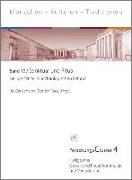ForschungsCluster 4. Sanktuar und Ritual
BücherAngebote / Angebote:
Der Band aus dem Bereich des DAI Forschungsclusters 4 "Heiligtümer: Gestalt und Ritual, Kontinuität und Veränderung" enthält eine Einleitung [Gehrke] und 40 Beiträge zu den vier Forschungsfeldern "Kontinuität und Wandel an Kultorten" [6 Beiträge], "Ende und Nachleben von Kultorten" [4], "Gestalteter Raum" [11] und "Votiv und Ritual" [19]. Topographisch gesehen finden sich Beiträge zu Milet, Olympia, Abai / Kalapodi, Didyma, Resafa / Sergiupolis, Abydos, Heliopolis, Gadara, Isriye / Seriana, Gabii, Selinunt, Kreta, Mitteleuropa, der Iberischen Halbinsel, Baktrien, dem Jemen, dem Alten Orient und dem Alten Ägypten. Inhaltlich geht es u. a. um Plastik, Architektur, Spolien, Statuenbasen, überregionale Heiligtümer, Romanisierung, Theater-Tempel-Kombinationen, Grabtempel, Pyramiden und sonstige Gräber, punische und sabäische Heiligtümer / Heiligtum, ethnologische Ritualtheorien, Probleme der Interpretation miniaturisierter Weihgaben, Votivspektren, die Rekonstruktion von Kultmahlzeiten, Kleinfunde wie z.B. attisch rotfigurige Keramik und Horte. Zeitlich reichen die Befunde vom Frühneolithikum des 10./9. Jts. v.Chr. bis in islamische Zeit.
This volume emerged from DAI Research Cluster 4 "Sanctuaries: Form and ritual, continuity and change" and contains an introduction [Gehrke] and forty papers classified by the four research topics "continuity and change at ritual sites" [6 contributions], "end and afterlife of ritual sites" [4], "designed space" [11], and "votives and ritual" [19]. From a topographical point of view there are articles on Miletus, Olympia, Abai / Kalapodi, Didyma, Resafa / Sergiupolis, Abydos, Heliopolis, Gadara, Isriye / Seriana, Gabii, Selinunte, Crete, Central Europe, the Iberian Peninsula, Bactria, Yemen, the Ancient Near East, and Ancient Egypt. With regard to contents there is information e. g. on sculpture, architecture, spoils, statue bases, supra-regional sanctuaries, Romanisation, combinations of theatre plus temple, grave temples, pyramids, and other graves, Punic and Sabaean sanctuaries, ethnological theories of ritual, problems of the interpretation of miniature dedications, votive spectra, the reconstruction of ritual feasting, small finds such as Attic red figure vases, and hoards. The chronological span reaches from the Early Neolithic of the 10th/9th millennia to Islamic times.
Folgt in ca. 2-3 Arbeitstagen




